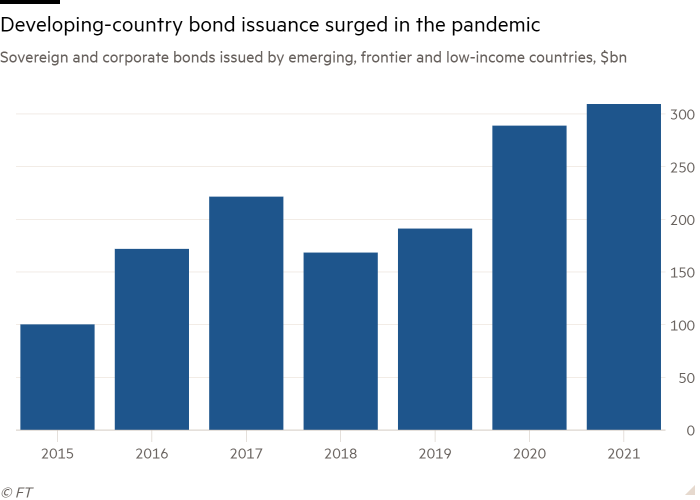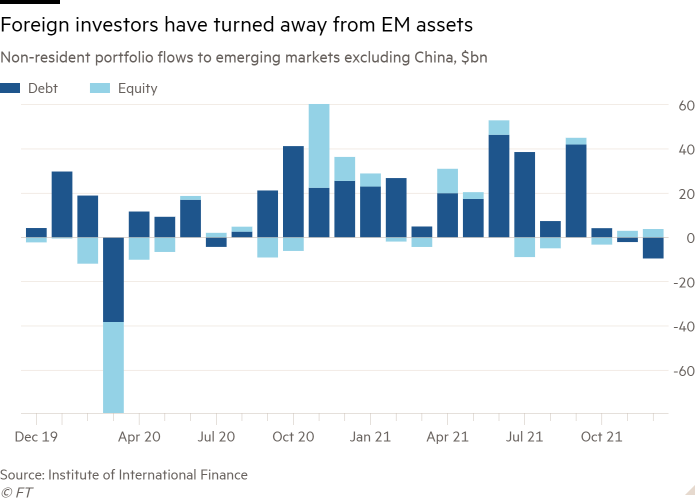The world’s poorest countries face a $10.9bn surge in debt repayments this year after many rebuffed an international relief effort and instead turned to the capital markets to fund their responses to the pandemic.
A group of 74 low-income nations will have to repay an estimated $35bn to official bilateral and private-sector lenders during 2022, according to the World Bank, up 45 per cent from 2020, the most recent data available.
One of the most vulnerable countries is Sri Lanka, where the rating agency S&P Global last week warned of a possible default this year as it downgraded the country’s sovereign bonds. Investors are also concerned about Ghana, El Salvador and Tunisia, among others.
David Malpass, World Bank president, warned that the “extraction of resources . . . by creditors” meant that “the risk of disorderly defaults is growing”.
“Countries are facing a resumption of debt payments at precisely the time when they don’t have the resources to be making them,” he said.
The increase reflects developing economies taking on more debt to cope with the economic and healthcare impact of coronavirus, as well as the rising cost of refinancing existing borrowings and the resumption of debt repayments suspended after the pandemic hit.
About 60 per cent of all low-income countries need to restructure their debts or are at risk of needing to, and fresh sovereign debt crises are likely, the World Bank warned in economic forecasts published last week.
Governments and companies in low- and middle-income countries issued bonds worth about $300bn each year in 2020 and 2021, more than a third higher than pre-pandemic levels, according to data from the Institute of International Finance, a financial industry association.

The impending surge in repayments comes despite a pandemic-driven global initiative to relieve poor countries’ debt burdens, which proved a damp squib.
The Debt Service Suspension Initiative, launched by the G20 group of large economies in April 2020, aimed to defer about $20bn owed by 73 countries to bilateral lenders between May and December 2020. But despite being extended to the end of 2021, just 42 countries got relief totalling $12.7bn, according to the Paris Club group of creditor nations which helped co-ordinate the initiative along with the World Bank and the IMF.
Those countries must resume their repayments this year and start repaying debts that were suspended under the scheme.
Meanwhile, borrowing costs are rising.
In the first two years of the pandemic, interest rate cuts by big central banks made it relatively cheap for governments to borrow. But as investors expect that global monetary conditions will tighten later this year, it is becoming more expensive to refinance existing debts.
Developing economies led by Brazil and Russia have been aggressively raising rates for several months to fight a surge in inflation. But in many countries interest rates are still below the pace of price growth, and cross-border capital is flowing out of emerging market stocks and bonds.

“Market access is a wonderful thing to have when there is cheap money out there, but there might be a different view as conditions tighten,” said Ayhan Kose, head of the World Bank’s economic forecasting unit.
Asset managers, economists and debt campaigners have all called for fresh action to relieve the debt burden on poor countries.
“The problems of debt are mounting and the fiscal space of the developing world will continue to shrink. We really are at risk of another lost decade for developing countries,” said Rebeca Grynspan, secretary-general of the United Nations Conference on Trade and Development.
Gregory Smith, emerging market strategist at M&G Investments, said: “Another debt crisis, however triggered, would have very strong impacts on countries with high debt levels . . . We have one or two years in which to design something to support countries falling into systemic crisis.”
The most indebted nations could seek relief from a scheme intended by the G20 to replace the DSSI. The “common framework” obliges participating countries to first agree terms with bilateral creditors and the IMF, then to secure the same debt relief from private creditors.
However, critics say this risks cutting off countries’ access to capital markets. Only Chad, Ethiopia and Zambia have applied and negotiations show little sign of progress.
“You know what it means for a country to say publicly it has problems paying its debts,” Grynspan said. “The private sector will punish them. If a country has any choice, it won’t do it.”
For all the latest Business News Click Here
For the latest news and updates, follow us on Google News.
